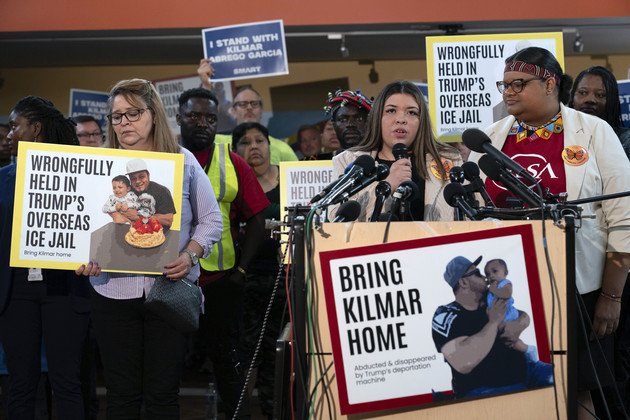After months of legal wrangling, diplomatic tension, and judicial rebukes, Kilmar Abrego Garcia, a Maryland man mistakenly deported to El Salvador earlier this year, has been returned to the United States to face federal criminal charges, U.S. Attorney General Pam Bondi announced Friday.
The 2025 deportation saga had grown into a constitutional standoff between the Trump administration and the federal judiciary, as courts demanded that the government take action to facilitate Garcia’s return — a mandate the executive branch resisted for weeks, citing diplomatic limitations and characterizing the deportation as an “administrative error.”
Indicted in Tennessee
Garcia is now facing two federal charges in the Middle District of Tennessee:
-
Conspiracy to unlawfully transport illegal aliens for financial gain, and
-
Unlawful transportation of illegal aliens for financial gain.
The unsealed indictment accuses Garcia and several others of operating a multi-year scheme that transported thousands of undocumented migrants, including alleged MS-13 gang members, across the U.S. without legal authorization. Prosecutors claim the operation generated substantial profits by moving individuals who had no legal status to remain in the country.
Legal Controversy and Political Backlash
What made Garcia’s case particularly explosive, however, wasn’t the indictment — but the violation of a 2019 federal court order that barred his deportation to El Salvador. That original ruling cited serious risks of gang-related violence if Garcia were returned to his home country.
Despite this, the Trump administration deported Garcia in March 2025 to El Salvador’s mega-prison, drawing a sharp rebuke from legal experts and civil rights advocates. U.S. District Judge Paula Xinis later described the move as a potential “incipient constitutional crisis,” noting the government’s failure to comply with judicial directives.
Government Pushback
The administration’s public stance further escalated tensions. In April, Attorney General Bondi claimed, “President Bukele said he was not sending him back. That’s the end of the story.” Her comments drew widespread criticism from across the political spectrum, with many arguing they represented a dangerous undermining of judicial authority.
While Garcia is now back on U.S. soil, his long-term legal fate remains uncertain. Officials say they may attempt to remove him to a third country or seek to overturn the 2019 court order that originally blocked his deportation. They have also continued to allege that Garcia has ties to MS-13, a group the U.S. classifies as a foreign terrorist organization — claims his attorneys strongly deny.
Ongoing Legal Proceedings
Judge Xinis has ordered a fact-finding process to determine whether the government acted in bad faith or violated constitutional rights during Garcia’s deportation. That review continues behind closed doors.
While Garcia’s return may ease short-term tensions between the branches of government, his case is far from resolved — and could still set a lasting precedent on immigration enforcement, executive power, and due process protections in the United States.

 English
English



























































